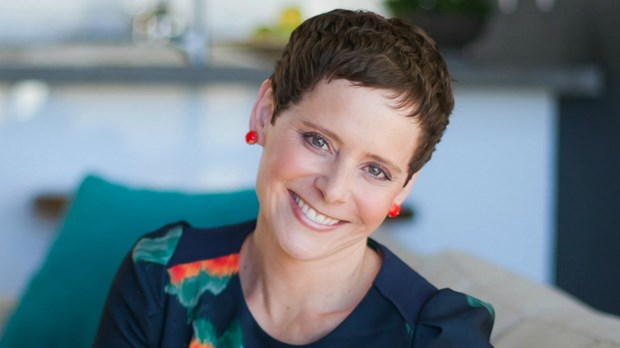Joy: The Ultimate Trump Card

Named by Christianity Today as one of 50 women shaping culture and the church today, self-proclaimed “hot mess” Margaret Feinberg is a popular author, a Bible teacher, and a woman who loves adventure. When she was diagnosed with cancer in 2013, Margaret chose a very unlikely weapon for the battle ahead: joy. This tool proved so effective and life-giving for Margaret that her story is now giving hope to women everywhere who are facing their own fights. We wanted to hear more about her journey with joy, the theology supporting it, and the book she wrote about her experience, which is aptly named Fight Back With Joy.
You chose to pick up a very unlikely weapon, and one I’d never once considered during my own darkest days: joy. What are more common “weapons” for the battle? Why did you choose joy?
Some time ago, I felt compelled by the Holy Spirit to go on a joy quest. I dug into Scripture, researching the more than 400 passages on joy, happiness, rejoicing, merriment, and more. The Bible resounds with a sacred call to live joyfully. We’re meant to radiate joy everywhere we go. Yet if we’re honest, it’s amazing how fast our joy erodes.
Some causes for this are external: the stress of work, the pressures of parenting, the expectations of managers, the difficult diagnosis, the financial burden. Others are internal—that inner voice that says if you just do enough, accomplish enough, sell enough, achieve enough, you’ll lay hold of the life you’ve always wanted.
But it’s never enough.
While in final edits for a book on joy, I received the heartbreaking news that I had breast cancer. Plunged into a world of greater pain and suffering than I’d ever known, I had to scrap the project. Up until then, I’d searched for joy in the good times of life. Now I had to find joy amidst unspeakable pain and darkness. No one signs up for that assignment. No one.
Against all odds, I’ve found my capacity for joy expanding and discovered something quite startling: more than whimsy, joy is the weapon we use to fight life’s battles.
Joy is a far more dynamic, forceful weapon than most people realize. When we fight back with joy, we lean into the very presence of God—the one who fills us with joy, even on our most deflated todays. Most of us will be tempted to reach for a different weapon, like anger, bitterness, resentment, depression, or contempt. We might choose to lash out. But joy is always available in our arsenal.
No matter who you are or what your situation is—whether your life is marked by cloudless skies and serene seas or a torrential downpour and darkness—you can fight your hardships with joy.
How did those around you react to your choice to use joy in your fight against breast cancer?
On the day I received my diagnosis, I told one of the nurses I was going to fight back with joy. I’ll never forget her response—she looked startled and asked me where I was going to get this kind of joy.
This opened up the opportunity to share about Jesus. People who aren’t believers are surprised and intrigued. They want to know more. What’s funny is that the few naysayers in the whole thing have been Christians. Ironic, really. The ones endowed with the richest reservoirs of joy are the most skeptical. Of course, on the hardest of days, I was the biggest naysayer.
What similarities did you notice between your diagnosis and the variety of crises other women were facing?
The labels we place on crisis, hardship, adversity, pain, loss, and suffering may vary, but when each of us is cut, we bleed red. No one escapes life unscathed. You may be in a fight right now, or maybe you’re just climbing out of the trenches. Whether it’s a painful divorce, the pangs of an empty nest, the addiction that refuses to lose its grip, the heartbreak of infertility, or the difficult diagnosis, sooner or later we all wake up on the battlefield. We have to determine how we will respond.
How is what you’re proposing in Fight Back With Joy different from a lighthearted “Don’t worry, be happy” philosophy?
Fight Back With Joy doesn’t offer any “buck up” or “swim in denial” approaches that lead to frustration, or worse, a cheapened version of joy. Instead, Fight Back With Joy takes a deep voyage into the scriptural reality that we are founded on joy, purposed for joy, and destined for joy. We can go beyond choosing joy. We can pursue and activate it in a way that radiates the goodness of God.
My book is about teaching people to practice the art of reclamation. It’s about learning to rejoice when it makes no sense, and praying for springs in the desert.
I recognize that those who aren’t currently walking among the fellowship of the afflicted may look at these tactics as simple or silly, but when you’re in the fight of your life, these tactics will empower you to grasp for God and find him—even in the darkness.
Can you unpack the theology behind fighting with joy?
Much of the teaching I’ve heard on joy throughout the years is oversimplified. I remember learning in elementary school that J-O-Y is spelled “Jesus, Others, Yourself.” While that made perfect sense when I was nine, I’ve seen how distorted that can become for adults.
I see friends who love Jesus but spend so much time pouring into their kids, grandkids, and others that their joy looks something like this: “jOy.” Technically, it still spells joy, but more than anything, these men and women who are so exhausted, so empty, and running on fumes from pouring into others need to pause and take time to focus on themselves. Laying hold of joy right now will require them to reevaluate for a season and discover the joy that comes with “JYo.”
I’ve also noticed how most of the definitions of joy define it more by what it isn’t than what it is. I constantly hear that happiness is based on circumstance but joy is not dependent on circumstance.
But biblical expressions of joy have turned out to be far different than what I was taught. Now, I’m convinced the writers of the Bible would say that the reason we have joy is because we have great circumstances. If you are a child of God, you are drenched in the grace and mercy of God. No matter what you’re facing, your circumstances are better than you think. If you’re not experiencing joy, perhaps it’s because your definition of joy is too narrow.
That’s what I’ve been discovering over the last three years of diving into Scripture and examining joy, happiness, merriment, rejoicing, singing, dancing, and more. When it comes to joy, God is anything but stingy. I believe the church needs a new definition of joy that encompasses the entire spectrum of emotions, responses, and reactions found in Scripture. We need a new definition of joy because we need a new definition of ourselves.
Our God is a joyful God. The nature of God brims with affection and delight. God takes great pleasure in his Son. In Matthew 3:17, God echoes down from heaven, “This is my dearly loved Son, who brings me great joy.”
During the transfiguration in Matthew 17:1–2, Jesus’ face shines like the sun and his clothes becoming luminous. The delight of the Father is literally reflected in the Son. That’s why I want to invite you to lay hold of a deeper, more robust joy than you’ve ever known before. It’s a delight that comes from knowing that the Creator of the universe delights in you.
What about this choice for joy in your life has been the hardest? And what might be hard about it for women in a variety of other circumstances?
Some days fighting back with joy seems impossible. I get that. I spent a year feeling like I was being tortured. Some days just breathing in and out felt like a major win. To this day, I still wrestle with the stress, anxiety, and PTSD from the brutal treatments. But if you’re in a real battle, you’ve got to fight, fight, fight. Why not fight back with joy?
Try it. You’ll be surprised at the outcome. I promise.
Read more articles that highlight writing by Christian women at ChristianityToday.com/Women
 Read These Next
Read These Next

 You Are Worth Fighting ForFor when you feel too fat, too frumpy, too stupid, or too poor
You Are Worth Fighting ForFor when you feel too fat, too frumpy, too stupid, or too poor

 Fall-Apart MomentsParenting inevitably leaves us discouraged, empty, and grasping . . . but maybe that's a good thing.
Fall-Apart MomentsParenting inevitably leaves us discouraged, empty, and grasping . . . but maybe that's a good thing.








 Homepage
Homepage
